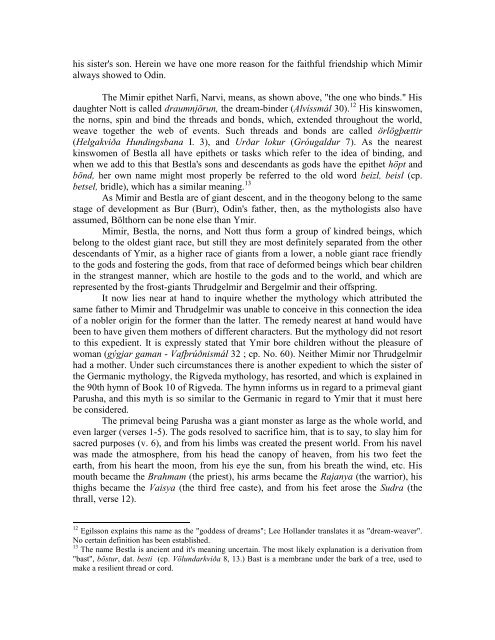Chapters 44-95 - Germanic Mythology
Chapters 44-95 - Germanic Mythology
Chapters 44-95 - Germanic Mythology
You also want an ePaper? Increase the reach of your titles
YUMPU automatically turns print PDFs into web optimized ePapers that Google loves.
his sister's son. Herein we have one more reason for the faithful friendship which Mimir<br />
always showed to Odin.<br />
The Mimir epithet Narfi, Narvi, means, as shown above, "the one who binds." His<br />
daughter Nott is called draumnjörun, the dream-binder (Alvíssmál 30). 12 His kinswomen,<br />
the norns, spin and bind the threads and bonds, which, extended throughout the world,<br />
weave together the web of events. Such threads and bonds are called örlögþættir<br />
(Helgakviða Hundingsbana I. 3), and Urðar lokur (Gróugaldur 7). As the nearest<br />
kinswomen of Bestla all have epithets or tasks which refer to the idea of binding, and<br />
when we add to this that Bestla's sons and descendants as gods have the epithet höpt and<br />
bönd, her own name might most properly be referred to the old word beizl, beisl (cp.<br />
betsel, bridle), which has a similar meaning. 13<br />
As Mimir and Bestla are of giant descent, and in the theogony belong to the same<br />
stage of development as Bur (Burr), Odin's father, then, as the mythologists also have<br />
assumed, Bölthorn can be none else than Ymir.<br />
Mimir, Bestla, the norns, and Nott thus form a group of kindred beings, which<br />
belong to the oldest giant race, but still they are most definitely separated from the other<br />
descendants of Ymir, as a higher race of giants from a lower, a noble giant race friendly<br />
to the gods and fostering the gods, from that race of deformed beings which bear children<br />
in the strangest manner, which are hostile to the gods and to the world, and which are<br />
represented by the frost-giants Thrudgelmir and Bergelmir and their offspring.<br />
It now lies near at hand to inquire whether the mythology which attributed the<br />
same father to Mimir and Thrudgelmir was unable to conceive in this connection the idea<br />
of a nobler origin for the former than the latter. The remedy nearest at hand would have<br />
been to have given them mothers of different characters. But the mythology did not resort<br />
to this expedient. It is expressly stated that Ymir bore children without the pleasure of<br />
woman (gýgjar gaman - Vafþrúðnismál 32 ; cp. No. 60). Neither Mimir nor Thrudgelmir<br />
had a mother. Under such circumstances there is another expedient to which the sister of<br />
the <strong>Germanic</strong> mythology, the Rigveda mythology, has resorted, and which is explained in<br />
the 90th hymn of Book 10 of Rigveda. The hymn informs us in regard to a primeval giant<br />
Parusha, and this myth is so similar to the <strong>Germanic</strong> in regard to Ymir that it must here<br />
be considered.<br />
The primeval being Parusha was a giant monster as large as the whole world, and<br />
even larger (verses 1-5). The gods resolved to sacrifice him, that is to say, to slay him for<br />
sacred purposes (v. 6), and from his limbs was created the present world. From his navel<br />
was made the atmosphere, from his head the canopy of heaven, from his two feet the<br />
earth, from his heart the moon, from his eye the sun, from his breath the wind, etc. His<br />
mouth became the Brahmam (the priest), his arms became the Rajanya (the warrior), his<br />
thighs became the Vaisya (the third free caste), and from his feet arose the Sudra (the<br />
thrall, verse 12).<br />
12 Egilsson explains this name as the "goddess of dreams"; Lee Hollander translates it as "dream-weaver".<br />
No certain definition has been established.<br />
13 The name Bestla is ancient and it's meaning uncertain. The most likely explanation is a derivation from<br />
"bast", böstur, dat. besti (cp. Völundarkviða 8, 13.) Bast is a membrane under the bark of a tree, used to<br />
make a resilient thread or cord.
















